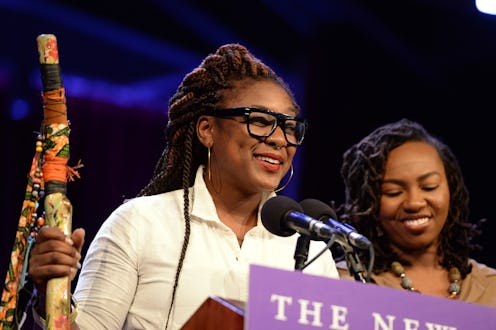News
Why This BLM Leader Won't Endorse Clinton
Black Lives Matter has been a force for racial justice since 2013, putting matters of racial injustice in a more prominent position within public discourse. In 2015, Democratic presidential candidates Bernie Sanders and Hillary Clinton began mentioning the movement in their speeches and during debates, and both of them met with leading activists. The relationships between each candidate and BLM have been rocky at times, and neither have garnered an endorsement from the movement. With the former secretary of state having basically secured the Democratic nomination, co-founder of BLM Alicia Garza explained why she won't endorse Clinton.
In an interview with Elle, Editor-at-Large Melissa Harris-Perry asked Garza if she'd endorse Clinton, and Garza responded: "Publicly? Absolutely not." She elaborated on her strong dissatisfaction with the candidate:
I lived through the Clinton years. Incarceration through the roof, the demonization of poor black women, the unraveling of the social safety [net]. ... Even though white women actually took advantage of government assistance and whatnot, so then black women were deemed the Cadillac drivin', hair in rollers, bon-bon eatin' women with eight kids.
Anticipating the criticism that "the Clinton years" refers to policies under President Bill Clinton and not Hillary, Garza noted:
I am like no, no it's not like she was sipping tea! She was also campaigning on those policies.
Clinton has confronted criticism from BLM concerning her support for her husbands' 1994 crime bill and welfare reforms, both in arranged meetings and in protests, and she has responded to these criticisms in various ways. Concerning the crime bill, which helped facilitate mass incarceration, which disproportionately impacts the black community, Clinton said during one of the debates, "there were decisions that were made that now we must revisit and we have to correct." She also apologized for the results of the bill: "I’m sorry for the consequences that were unintended and that had a very unfortunate impact on people’s lives."
Clinton has also responded to criticisms concerning welfare reforms passed by her husband when he was in office, and which she gathered support for in Congress as first lady. The reforms, which changed the way welfare programs were funded and ultimately left them with less money to be implemented for eligible families, were promoted with rhetoric of getting lazy people out of the system and into jobs. Clinton said in a 2002 interview, as senator for New York, that individuals who left welfare programming are "no longer deadbeats — they’re actually out there being productive." The Nation reported that, between 1996 and 2011, the rate of black families in extreme poverty increased 183 percent — more than other demographics — suggesting they were most impacted by the reforms.
On the campaign trail, most of what Clinton has said about welfare reform has focused on the positives, like getting people back to work with jobs training programs. She acknowledged that the system needs some adjustment in an interview with WNYC: "Now we have to take a hard look at it again, especially after the Great Recession." She also pointed out particular problem areas, like the five-year lifetime limit on benefits, and how some states put limitations on provisions of the reforms that enable people on welfare to further their education.
For her part, Garza is not convinced that Clinton has done enough to overcome what she sees as an unacceptable record on issues that disproportionately impact the black community. She will, therefore, not be endorsing Clinton.
